
To be listed on the haciendadelalamo TODAY MAP please call +34 968 018 268.
article_detail
Spanish News Today Editors Roundup Weekly Bulletin July 5

TOP STORIES: "Drought spells fears of swimming pool restrictions in Murcia and Spain" & "Making sure your air conditioning is in working order"
We give a warm (or stiflingly hot, in some places) welcome to July. It was Independence Day in the USA this Thursday, and also the UK general election, which presented few surprises as Labour trounced the Conservatives.
In this week’s Editor’s Roundup Weekly Bulletin, we’ve got your usual Murcia, Alicante and Andalucía news, plus a few stories from around the rest of Spain and features on dealing with the extreme heat, the latest in the Jay Slater case and the prospect of drought restrictions in parts of the country:
Water world
You’ll have noticed it’s getting very hot again and, despite the torrential rains we had just three weeks ago, with the return of the sunshine and heat comes talk of hosepipe bans and other measures to ensure there is enough water for everyone, not least of all firefighters battling blazes in the tinder-dry countryside.
The Costa del Sol was facing the possibility of restrictions on swimming pools a couple of months ago, but in the end these have either been overturned or not materialised in the first place. Catalonia in the north has also faced a water crisis this year and is toying with restrictions.
Now it is the turn of the Region of Murcia to be in the firing line for calls to ban filling up swimming pools as a drought crisis measure.
The Association of Consumers and Users (CONSUMUR) has requested that the regional government put in place a prohibition on filling up private, single-family swimming pools, like the kind found in detached villas.
It is not just drinking water and water for firefighters that they want to preserve. Murcia relies heavily on its agriculture industry, growing fruit and vegetables for much of Spain and Europe, and this year’s drought is estimated to have caused up to 289 million euros’ worth of losses for farmers.
In an autonomous community that also has more than 50,000 private swimming pools which get filled up every summer – the third highest number in Spain proportional to the population – this disparity is offensive and irresponsible, according to CONSUMUR.
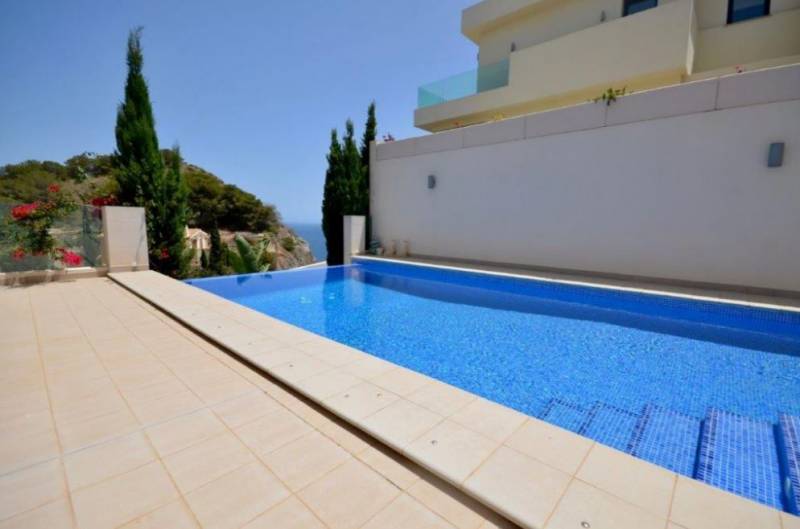
As it is, no one in the Region of Murcia government is yet listening to this plea, as far as they have revealed, anyway. But just up the coast in neighbouring Alicante province, one town has gone ahead and set a precedent for what certain water-strapped Murcia municipalities might decide to do unilaterally.
This Wednesday, Altea’s Mayor issued an emergency order enforcing immediate “exceptional measures” to combat the drought, making it the first town to implement a swimming pool ban.
These measures primarily impact the areas of La Malla (Altea Hills), Mascarat, Alhama Candela and Sierra Altea II, where water from the home supply network is now prohibited for non-essential use.
So, what does this mean for residents and businesses in the affected areas? A breakdown of the drought crisis measures shows that it is prohibited to water gardens, orchards, terraces, green spaces and sports areas, whether private or public, as well as to fill private or public swimming pools, ponds or fountains.
There is also a ban on cleaning and sweeping of roads, streets, paths and pavements, both public and private.
Despite these restrictions, the Mayor’s Office has guaranteed a full supply of drinking water for residents and businesses throughout the summer and beyond, although this relies on a wet autumn to replenish reservoirs.
In the rest of the Marina Baixa area, which includes the popular tourist destination of Benidorm, urban water supply remains a “priority”, according to Miguel Polo, president of the CHJ water authority.
While these measures may be inconvenient, they are necessary to preserve water resources during this challenging drought. It is a delicate balance between ensuring water availability for essential needs and the impact on daily life and businesses, especially in a bustling tourist region like Alicante.
How to choose the right air conditioning unit this summer

As July arrives, it’s probably time you thought about turning on your air conditioning. I know of more than one case this year where people have put the A/C on for the first time since 9 months ago, only to find that it’s kaput.
That’s why it seemed only fitting to do a mini-guide for those poor unfortunate souls who are in dire need of a new air conditioning unit, stat.
Choosing the right air conditioning unit can be a challenge because the market changes so much from year to year, with energy efficiency being a major factor.
You have to consider sustainability and be sure to read the efficiency label on each unit. These labels indicate the energy-saving capabilities of the air conditioning system. Opting for a class A efficient unit can result in significant savings on monthly energy bills.
For the really high-tech models, units equipped with motion sensors and thermostats that can be controlled via smartphones can reduce energy expenditure even further.
You also need to decide on the type of energy system – the market offers electric and aerothermal energy-powered systems. Aerothermal systems are more sustainable and ecological, extracting up to 75% of their energy from the outside atmosphere, thus significantly reducing energy consumption. Although these systems have a higher initial cost, they prove to be more cost-efficient over time.
On the other hand, electric systems are more affordable to purchase and install, providing an immediate cost benefit.
The noise level of the unit is another important factor. You don’t want an A/C unit that’s so loud you can’t hear yourself think. The heat’s already melted our brains enough! The ideal noise range for a quiet air con system is between 16 and 24 decibels, so have a look at the decibel level before you purchase.
When it comes to the cost of cooling, it’s necessary to consider the upfront cost of the unit, its energy consumption, and its cooling capacity, which is measured in Frigories.
A bit of maths is necessary here. To determine the required cooling capacity, calculate the cubic metres of the room (width x length x height) and multiply this by 50. This will give you the Frigories per hour needed to cool the room effectively.
Lastly, aesthetics play a role in selecting an air conditioning unit. Some air con is just plain ugly, which isn’t necessarily the kind of thing you want to be installing in your house and looking at every day.
Thankfully, with modern designs constantly emerging, some air conditioning units are now sleek and chic, and some are even made to resemble paintings, blending seamlessly into your decor. This advancement means you no longer have to compromise on style to stay cool.
These are just a few things to consider to help you make a well-informed decision and choose an air conditioning unit that meets your needs, but the best advice is to consult a professional… especially when it comes to installing the thing!
Jay Slater latest
It’s been almost three weeks since 19-year-old apprentice bricklayer Jay Slater disappeared in the mountains of Tenerife, and the third week that we’ve given you an update in our Editor’s Roundup Weekly Bulletin. If anything, the case just continues to bring up more questions than answers.
Despite large-scale searches involving one of Spain’s most experienced canine units and international media coverage, not a trace has been found of the Lancashire teen.
On the contrary, the mystery surrounding his disappearance has deepened.

To recap, Jay travelled to Tenerife with two pals and they went to the NRG music festival on the Canary Island on Sunday June 16, but rather than returning to his hotel, Jay went back to an Airbnb in Masca, around an hour’s drive from the gig, with two British men he had met.
He left the accommodation early the following morning but decided to walk back to his hotel when he realised he had missed the bus. However, a local woman reported seeing Jay walking towards the forbidding Rural de Teno national park, which was the wrong direction.
Shortly before 9am, the Teenager called his friend Lucy and told her he was lost in the mountains with no water, and his battery was about to die.
A huge search was launched and authorities were initially confident that they would quickly locate the lost tourist, but he seems to have vanished into thin air. After two weeks, the Spanish police called off the hunt, but the investigation has continued, and it’s developed up a few unusual twists and turns.
Investigator Mark Williams-Thomas, known for his work on the Madeleine McCann case, has joined the investigation. It seems that Jay’s friends claim they saw an image on Snapchat in which Jay admitted to stealing a Rolex and asked for help to sell the luxury watch.
This would have been around the time he left the Airbnb, and the identity of one of the men he stayed with has been revealed this week.
The man is believed to be Ayub Qassim, a 31-year-old who has spent time in prison for being the mastermind behind a sophisticated drug operation in Wales.
“I let him stay at my house because he had nowhere else to go and all his friends had abandoned him. I know Jay through friends, I did him a favour and now my face is all over the news,” Mr Qassim said this week.
But Mr Qassim is adamant also that Jay was alive and well when he left the Airbnb on the fateful Monday morning.
The Spanish authorities have insisted that neither of the two Britons Jay spent the night with are under suspicion, although officers did conduct a second search of the Airbnb earlier in the week.
The investigation continues.
Murcia
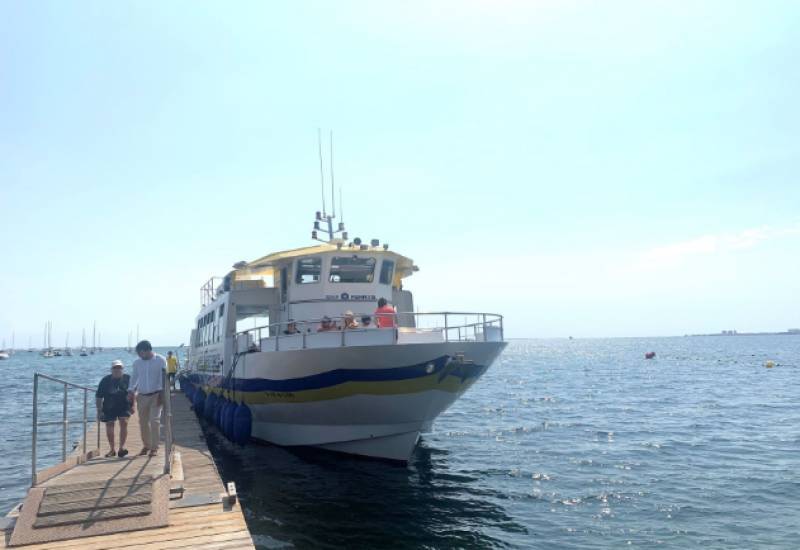 Some very exciting news for anyone planning to be in the Mar Menor area this summer as the ferry service has resumed between Santiago de la Ribera and La Manga del Mar Menor.
Some very exciting news for anyone planning to be in the Mar Menor area this summer as the ferry service has resumed between Santiago de la Ribera and La Manga del Mar Menor.As of this Monday just gone, July 1, the ferry is back in working order, providing scenic maritime transport and convenient connections just in time for summer. It was stopped several months ago, shortly after it restarted, but now – fingers crossed – it is back in action for good.
The ferry will now run year-round with four daily departures from each shore. It takes about 40 minutes from coast to coast, from Tomás Maestre port in La Manga to Santiago de la Ribera’s Barnuevo beach, and is actually a really lovely little pootle across the water.
In addition, extra night-time services will be put on during summer festivals in San Javier. Tickets cost 6 euros each way, with a small additional fee for bicycles, scooters, strollers and pets, while children under 4 travel for free.
In a tragic incident this Wednesday July 3, an elderly couple died in a car crash at the other end of La Manga, on the RM-12 dual carriageway, after driving on the wrong side of the road.

The 89-year-old driver turned onto the wrong side of the road at the Cabo de Palos junction, leading to a head-on collision at kilometre 17 near the Calblanque exit.
The Cartagena Fire Brigade had to free the couple from their car, and they were taken to Santa Lucía hospital in critical condition. Unfortunately, they later died from their injuries.
Another person in the other car sustained minor injuries and was treated at Hospital General Universitario Los Arcos del Mar Menor.
Sticking on the roads, and in Cehegín up in the northwest of the Region, almost reaching up to the border with Albacete, an off-duty Guardia Civil officer saved the life of a British man who suffered a heart attack while driving.
The officer, who was driving along the RM-B16 road at the time, noticed a car that had swerved and crashed into a wall. He found the driver, who showed signs of cardiorespiratory arrest, and immediately called emergency services before providing first aid.
Thanks to the officer’s quick actions, the British man was kept alive until emergency personnel arrived and transported him to Virgen de la Arrixaca hospital for further treatment.
Back to the good news now, though, because there’s plenty of that too and it’s nice to be able to share it with you.
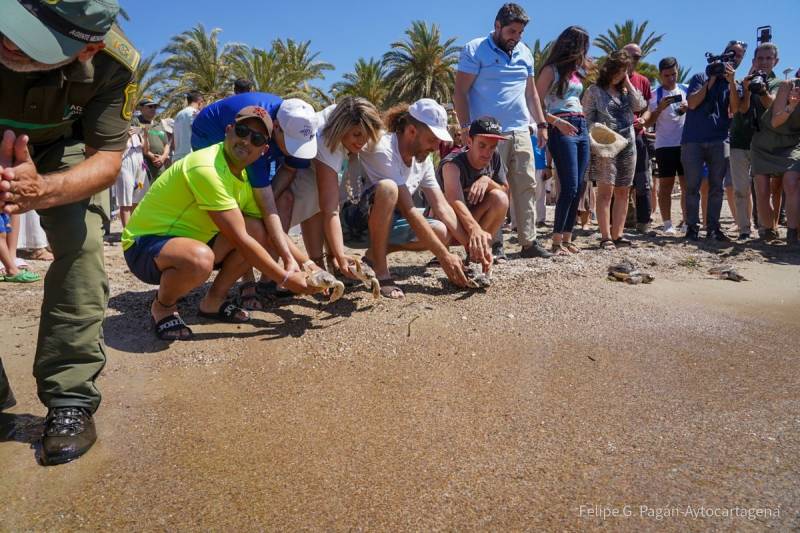 In Cartagena, some 30 loggerhead turtles were released on Isla Plana beach this week. These come from a nest that was sighted by locals a year ago on the same beach, which had 117 eggs in it.
In Cartagena, some 30 loggerhead turtles were released on Isla Plana beach this week. These come from a nest that was sighted by locals a year ago on the same beach, which had 117 eggs in it.The nest was subsequently relocated to Calblanque beach for monitoring and protection, and of the 117 eggs, 51 hatched. Those 51 hatchlings, each now weighing about one kilo, have been microchipped for tracking, and the remaining 21 will soon be released as well.
Meanwhile, traces of loggerhead turtles were found on Amoladeras beach in Cabo de Palos, prompting the assignment of a biologist to the area to ensure the turtles can lay their eggs undisturbed.
Loggerhead turtles, known in Spanish as ‘tortuga boba’, are classified as ‘vulnerable’ and ‘endangered’ and are protected under Spanish law and by the International Union for Conservation of Nature (IUCN).
If a loggerhead turtle or its tracks are spotted, the official advice is to call the emergency services immediately without interacting with the turtles to avoid stressing them and hindering egg-laying, which has sadly happened in the past.
It is so important for these animals to be able to lay their eggs in nests on the beach, and for authorities to be able to find those eggs and properly incubate them to ensure maximum population growth. That’s why, in Alicante this year, sniffer dogs have been introduced to help locate turtle nests for better protection and tracking!
Taking place in San Javier all this July is the 26th edition of the International San Javier Jazz festival. It truly is an international event, with British, Australian and American artists all lining up on the line-up, as well as Spanish jazz acts. You may not be an avid jazz fan, but there’s no denying that it’s an impressive artform to witness played live. So if you fancy it, there are still tickets available for several of the concerts. You can see the full programme here.
Talking of tickets, if you’ve never heard of them Taquilla Tickets are the place to go for your concert tickets, as well as organised coach trips out for the day to discover interesting different towns in Spain or to take part in kayaking, hiking, cycling or other guided trips.
Based at Condado de Alhama and run by husband-and-wife team Sally and Nigel, it’s a really nice way to be able to try something new in Murcia, and if they haven’t got what you’re looking for just talk to them and they’ll probably be able to sort something out for you.
Remember, for more events coming up soon in the Murcia area, you can always check out our EVENTS DIARY:
Spain
Investigators in Spain have been baffled following the death of a 45-year-old Irish tourist in the centre of Magaluf in the early hours of Monday morning. Michael Grant was found in the middle of Calle Martín Ros García in the bustling district of Calvià at 4.30am, covered in bite marks and sporting various other injuries.
 The father-of-four was on holiday with his wife Leanne, his kids and a few other families. He had reportedly spent the day drinking beside the pool before the group headed out on the town for the night.
The father-of-four was on holiday with his wife Leanne, his kids and a few other families. He had reportedly spent the day drinking beside the pool before the group headed out on the town for the night.A preliminary post-mortem showed leg and knee injuries, as well as a shards of glass embedded in a deep cut on Michael’s back, and police initially thought the Irishman might have been the victim of a hit and run.
However, further examination of CCTV footage in the area has shed light on the case, and officers are now questioning a street vendor they suspect may have had a brawl with Michael a short time before he collapsed on the street.
In the meantime, a second port-mortem has shown Michael consumed cocaine and alcohol before he died which is believed to be linked to his collapse and sudden death rather than any altercation preceding it.
In any case, his death is not being treated as a homicide at the moment.
In a heart-stopping moment that would shake even the most seasoned traveller, severe turbulence rocked a recent Air Europa flight from Spain to Uruguay. The frightening incident happened around four hours into the journey, resulting in injuries to more than two dozen passengers and an emergency landing in Natal, Brazil.
Passengers described a terrifying scene of chaos and panic as the plane suddenly lurched and shuddered. People were thrown violently around the cabin, with eyewitnesses recounting how a man and even a baby were flung from the seats and smashed into the overhead bins. It was a truly horrifying experience for all on board.
Unsurprisingly, several passengers sustained fractures and injuries to the neck and head, while many others were treated for shock. Brazilian health officials reported a total of 36 injured passengers, with 23 requiring hospitalisation. Four individuals were so severely hurt that they were admitted to intensive care for further treatment.
This incident comes just a month after a similar event on a Singapore Airlines flight, where turbulence caused the plane to drop 6,000 feet, injuring around 70 people and tragically claiming the life of a 73-year-old man.
While severe turbulence is rare, with only 163 serious injuries recorded in the US between 2009 and 2022, its impact can be devastating.
In other (slightly less dramatic) flight news, Irish singing sensation Sharon Corr of the well-known group The Corrs recently found herself in a bit of a musical mishap at the airport. The 54-year-old star, who currently lives in Madrid, took to social media to share a rather unfortunate travel tale involving her trusty violin and a Ryanair flight back to her home country.

Ms Corr, gearing up for an exciting tour with her siblings, was all set to fly from Madrid to Dublin when a hiccup occurred at the boarding gate. Her beloved violin, which she intended to bring along for rehearsals, was deemed extra luggage by Ryanair ground staff, requiring a separate fee.
Feeling “humiliated” and “angry”, the ‘Runaway’ star took to social media to express her disappointment. In an emotional post, she recounted her early morning wake-up call and the subsequent refusal to board. She wrote of her seven-hour wait at the airport and her eventual decision to return home, violin in hand.
Now, while Ryanair’s luggage policies aren’t always the most lenient, the airline is pretty clear about the rules, and musical instruments can be brought on board as long as they meet the standard carry-on baggage size allowance.
However, the budget carrier insists that Sharon’s violin was simply too large.
“This passenger was not refused travel from Madrid to Dublin (30 Jun),” a Ryanair spokesperson stressed.
“This passenger’s violin exceeded the cabin bag dimensions permitted for her flight, and therefore was required to pay a standard gate baggage fee to place it in the hold of the aircraft.
“This passenger refused to pay the standard fee and instead chose not to travel on this flight.”
While this travel tale had a less than harmonious ending, it serves as a reminder to always double-check luggage policies, especially when flying with unique items like musical instruments.
Hopefully, Ms Corr was able to book a different flight and make it to rehearsals without further ado.
Alicante
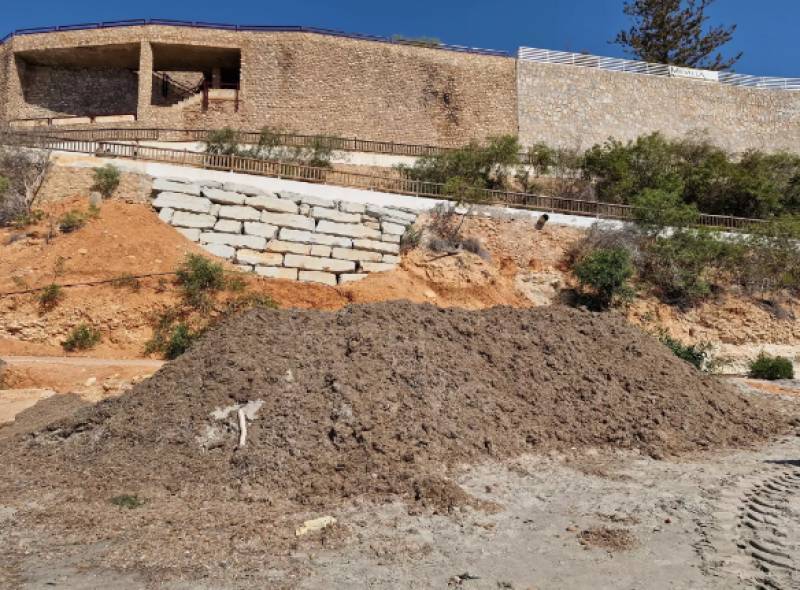 Beachgoers on the Orihuela Costa have been facing an unexpected, and somewhat smelly, situation this season. Just as the coastline reopened its beach bars and facilities, tonnes of algae washed up on shore, affecting even the busiest beaches like Cabo Roig.
Beachgoers on the Orihuela Costa have been facing an unexpected, and somewhat smelly, situation this season. Just as the coastline reopened its beach bars and facilities, tonnes of algae washed up on shore, affecting even the busiest beaches like Cabo Roig.Sunbathers and swimmers have been less than pleased, with many complaints about the unwelcome piles of seaweed.
So, what’s causing this green invasion? Well, the main culprit is posidonia, with a bit of seagrass (Cymodocea nodosa) thrown in. Storms and swells in the area have contributed to these organic materials ending up on the beaches.
While the Costa Blanca often sees accumulations of seaweed, affectionately known as “banks”, the sheer volume this year has taken many by surprise. A holidaymaker on La Caleta beach summed it up: “It is very annoying and creates bad smells.”
In response to the complaints, the Orihuela City Council has reassured residents and visitors that it is now just awaiting permission to remove the seaweed and promises that “the removal is imminent”.
Despite the unpleasant odours and eyesore, it’s important to remember that seaweed has a positive impact on beach stability. Its decomposition helps prevent excessive sand loss due to marine erosion, a big issue on the Orihuela Costa.
So, as we head further into the summer season, beachgoers can rest assured that the seaweed removal will commence soon, leaving the beaches pristine once more. In the meantime, remember: it’s not rubbish, it’s a vital part of the ecosystem!
Seaweed notwithstanding, Orihuela City Council’s Department of Tourism has prepared an exciting line-up of free activities and fitness classes on the beach over the next two months.
From Zumba to yoga and nature excursions, there’s something for everyone to enjoy.
 Kickstart your mornings or unwind in the evenings with energetic Xtromba and Zumba sessions, or find your inner peace with guided yoga practices, all taking place on the beautiful Playa Flamenca promenade.
Kickstart your mornings or unwind in the evenings with energetic Xtromba and Zumba sessions, or find your inner peace with guided yoga practices, all taking place on the beautiful Playa Flamenca promenade.No reservations are needed for these fun and social classes, so you can just show up and get moving.
If you’re a nature enthusiast, don’t miss the exciting excursions along the trails of the Orihuela Costa. Observe flamingos and seabirds at sunset during the ‘Pink Sunsets’ tour, or discover the protected flora of the ‘Dunes of Orihuela’. These low-difficulty tours are free, but places are limited, so be sure to book your spot through the Department of Tourism.
Do go ahead and join the Costa Blanca What’s On and Where to Go Facebook group to see more things to do around Alicante province!
Andalucía
After months of debate, the Junta de Andalucía is finalising its plan to build a coastal train to link the western Costa del Sol, which also includes proposals to scrap tolls on the AP-7 road and creating a public transport-only lane on the A-7, forming a “metropolitan corridor” around the coast.
Although the timeline remains uncertain, work could resume within a year, improving transport for key municipalities like Fuengirola, Mijas, Marbella, Estepona and Casares.
The coastal railway aims to ease traffic congestion, complementing changes to the underused AP-7 toll motorway and the A-7, and eventually there is a goal to extend from Fuengirola to Marbella, Estepona, Manilva and even as far as Algeciras in Cádiz, very near to Gibraltar.
In another Málaga town, Spanish police arrested a 55-year-old Scottish man in Nerja this week who was wanted in the UK for sexual assault charges. Acting on a tip-off from the UK’s National Crime Agency, the Guardia Civil conducted undercover surveillance on the man, who was living under a false identity.
The arrest took place while the fugitive was exercising on the beach – he was actually hanging upside down from some gymnastics rings at the time, making him vulnerable and unable to resist.
#OperacionesGC | Detenido en Nerja #Málaga un fugitivo escocés acusado de agredir sexualmente a 2 mujeres que había conocido en una app de citas.
— Guardia Civil (@guardiacivil) July 4, 2024
▶️Estaba reclamado por su país tras escapar en 2022 simulando una desaparición involuntaria.
🔗https://t.co/K2RJkRWo8L#UCO 🤝… pic.twitter.com/8vF6sOdCAZ
He is accused of sexually assaulting two women he met on Tinder in the UK. The trial for these offences was delayed due to his flight from Scotland in 2022, with only his abandoned car being found by a loch two years ago.
Following his location and arrest, the Scot has been handed over to the court in Spain, who will process the extradition order to the UK.
Meanwhile, in Almería province, summer beach bus services will be starting soon to connect the town of San José and the city of Almería with the beautiful beaches of the Cabo de Gata-Níjar Natural Park.
We told you last week that several of these beaches have restricted access to try and protect the Natural Park, but already in just the first 10 days of summer, nearly 5,000 vehicles registered access to these limited beaches.
That’s why the bus service is so important, to provide access to the beaches while respecting the limits to the number of people who can use them. Buses will operate from July 12 to September 1, 2024, departing hourly from 10.30am to 8pm, with five stops at Playa de Genoveses, Playas del Barronal, Playa de Mónsul, Playa Media Luna and Cala Carbón beaches.
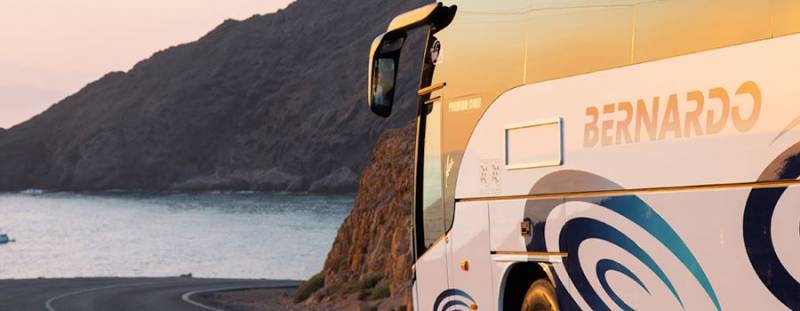
What’s more, it’s very affordable, with significant discounts available for anyone with one of those rechargeable green Andalucía metropolitan transport cards, which can reduce ticket prices by up to 75%.
Passengers from Almería city can combine the M-212 Almería-San José bus line with a free transfer to the beaches for just 80 cents using the card. Last summer, 16,000 trips were made on this bus line, and even more are expected this year, while retaining the ecological integrity of the Cabo de Gata beaches.
In another development, a mother lynx was sadly killed by a car in Huelva recently, leaving her pups orphaned. The body of the lynx was found on the A-49 motorway near Villarrasa, and it wasn’t until three days later that authorities located the cubs using a drone equipped with thermal imaging.
Luckily, they were found in good health in a safe area that had ample food for them, but the incident highlights something we’ve talked about before in these pages – the ongoing challenges in reintroducing native Iberian lynxes into the wild as traffic and human populations continue to encroach on their habitats.
Environmentalists have called for better protection, including ecological corridors, the elimination of road black spots and anti-poaching measures. Although the Iberian lynx has moved from endangered to vulnerable status, the threat of extinction remains if current issues aren’t addressed.
For now, let’s try to find the good in everything and celebrate the survival of the poor, orphaned lynx pups.
¡Tenemos localizados los cuatro cachorros de la lince atropellada este sábado en Huelva!
— Ramón Fernández-Pacheco M (@RamonFPM) July 2, 2024
Gracias a un dron con visor térmico, los profesionales de @LifeLynxconnect los han encontrado y confirman que están bien y en una zona inmejorable para encontrar alimento. pic.twitter.com/spjtWjeux3
You may have missed…
- Reminder to retired Brits in Spain: Letter from British Ambassador requires IMMEDIATE action.
All Brits living in Spain aged over 80 who claim a UK state pension need to complete a ‘life certificate’ before the end of this month to confirm they are still alive so they can keep receiving pension payments from the DWP. Due to a lower-than-expected response to letters which were sent out back in January, the deadline has been extended to July 31. - UEFA hand Murcia football stadium snagging list before Spain-Denmark game.
The Enrique Roca Stadium has been given a long “to do list” after a visit from UEFA to check the viability of the stadium’s specification to host the Spain-Denmark match in October. - Will a Labour government reverse Brexit rules for Brits in Spain?
Labour have won the general election in the UK, but what effect (if any) will it have for British people who live in, travel to or own property in Spain and the EU? - Accessibility in Spanish communities of owners: Legal right or ex-gratia concession?
Carrying out home renovations to a single property to add ramps or similar amenities is straight-forward enough and there are several grants available to help home owners do just this. But what if you live in a community of owners where not everyone requires the building to be accessible? - Murcia photo of the month July 2024.
See the top image of the month taken by the Los Alcázares Digital Camera Club (LADCC) for their monthly photo competition entitled ‘Natural History’, won by club member Gary Hull.
There we are then. Thanks for reading this issue of the Editor’s Roundup Weekly Bulletin, and keep your eyes peeled for next week’s.
Bye!
Contact Murcia Today: Editorial 000 000 000 /
Office 000 000 000























